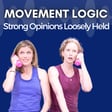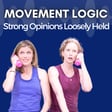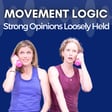
16: Training the Non-Traditional Athlete with Rosalyn Mayse, AKA Roz the Diva
Welcome to Episode 16 of the Movement Logic podcast! In this episode, Laurel is joined by multidisciplinary movement teacher, Rosalyn Mayse aka Roz the Diva. Laurel talks with Roz about how she went from always being picked last in gym class to building a successful career as both a personal triner and a pole dance instructor, and the often exclusionary industries both pole dancing and strength training occupy. Throughout, Roz shares stories of how she built a successful career (in her words) as a, “dark skin, semi-bald, overweight, outspoken woman running around NYC half naked.” Roz shares her humor and wisdom around what inclusivity actually looks like, as someone who understands firsthand what it feels like to be excluded.
Here’s more of what Roz and Laurel discussed:
- The different yet complementary fitness cultures of pole-dancing and strength-training
- The positive impression it made on Roz when she got to see female athletes that looked like her
- The benefits of an artistic focus in a movement practice
- How pole dancing helped Roz overcome guilt and shame about her body and exercise agency, self-exploration, and self-expression
- The fact that people in bigger bodies have to be stronger to overcome more body weight than slender people
- How Roz defines the term athlete. Spoiler: more broadly than the mainstream
- How Roz connects with clients who are skeptical about exercise after negative mainstream exercise experiences
- What the general public thinks pole-dancing and strength training are vs reality
Reference links:
Dangerous Curves New York Times Documentary about Roz
Sign up here for the Movement Logic Newsletter for course discounts and sales and receive a free mini Pelvic Floor course!
Watch the video of this conversation at: www.movementlogictutorials.com/podcast
Want more Movement Logic?
- Follow us on IG: @movementlogictutorials
- Get on our mailing list for tons of free content
- Contact us (we're super friendly)
Thanks for listening!


